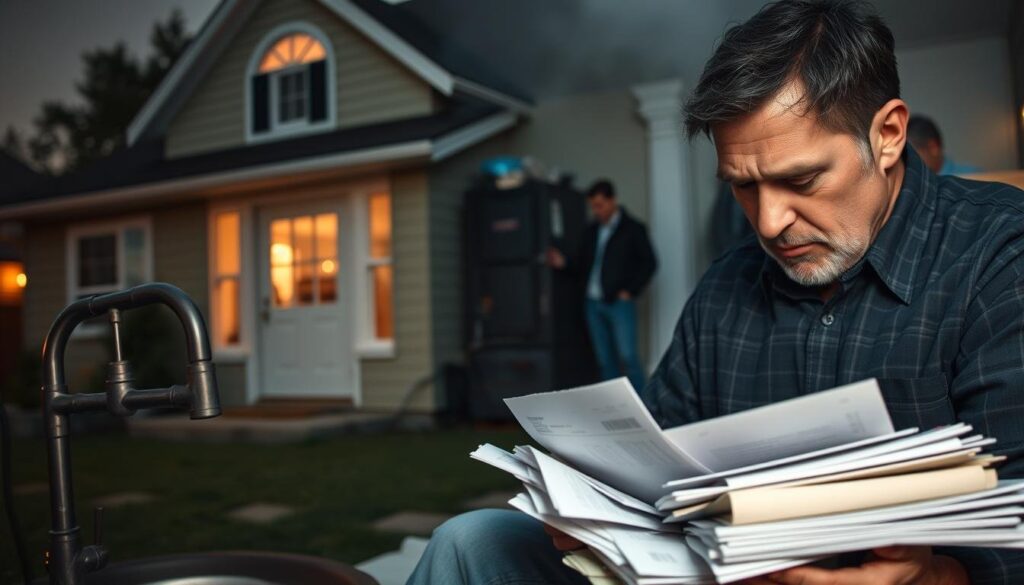Why Renting is Cheaper Than Buying a Home? When you’re deciding between renting and buying a home, many things matter. You might be thinking about the benefits of renting versus the perks of owning a home.
The cost is a big factor. The cost of homeownership isn’t just the price of the home. It also includes upkeep, taxes, and insurance. On the other hand, renting usually means a steady monthly payment, which is easier to plan for.
Knowing the differences between renting and buying is important. It helps you choose what’s best for your money and lifestyle. As you explore the US housing market, remember the financial impact of your decisions.
The Financial Burden of Upfront Costs
Buying a home can be expensive, making renting a good choice. When you buy a house, you need to pay a big down payment and other costs. These costs can really hurt your wallet.
Renting is different. You only need to pay a security deposit and the first month’s rent. This is much cheaper than a down payment. Renting lets you save money for other important things.
Let’s look at the costs of buying a home versus renting:
| Costs | Buying a Home | Renting |
|---|---|---|
| Down Payment | Typically 20% of the purchase price | None |
| Closing Costs | 2% to 5% of the purchase price | None |
| Security Deposit | None | Typically 1 month’s rent |
| First Month’s Rent | None | Required upfront |
The table shows buying a home costs a lot upfront. Renting helps you avoid these big costs. This lets you keep your money flexible.
Renting not only reduces the financial burden of upfront costs but also provides the flexibility to use your money elsewhere. You can invest, pay off debt, or save more. The benefits of renting are clear.
Monthly Expense Comparison: Rent vs. Mortgage
It’s key to compare monthly costs of renting and buying. Renters pay a fixed amount each month. Homeowners face a more complex calculation.
Homeowners pay a mortgage that includes principal, interest, taxes, and insurance (PITI). The biggest parts are usually the principal and interest.
Principal, Interest, and Amortization
Knowing about amortization helps understand your mortgage better. In the beginning, most of your payment goes to interest.
For example, a $200,000 mortgage at 4% interest for 30 years might cost about $955 a month. Early on, most of this goes to interest, not principal.
Renting avoids these complexities, offering a clearer monthly cost. This makes budgeting easier.
Renters face less uncertainty in their monthly payments. Mortgage payments can change with interest rates and taxes.
Why Is It Cheaper to Rent Than Buy in Today’s Market
Housing prices and mortgage rates are going up. This makes renting more appealing than buying a home. The US housing market is facing challenges, making renting a better choice for many.
Buying a home costs more than just the price. You also have to pay for maintenance, property taxes, and insurance. Renting, however, usually means just a security deposit and monthly payments. This makes renting more attractive to many.
Housing prices are rising, which means mortgage rates are going up too. This makes buying a home more expensive. Maintenance and repairs also add to the cost of owning a home.
In many US cities, the difference between renting and buying is clear. High demand and limited supply have driven up housing prices. This makes it hard for people to buy homes. Renting, however, offers the flexibility to move and avoid big financial commitments.
When you look at renting versus buying, think about the money side. Renting saves you from the upfront costs of buying, like down payments and closing costs. It also lets you invest your money elsewhere, where it might earn more.
In summary, the US market is making renting a more affordable choice than buying. With prices and rates rising, renting’s financial benefits are clear. When deciding on housing, consider the costs and benefits of renting versus buying in today’s market.
Hidden Costs of Homeownership
Buying a home comes with more than just the initial cost. You’ll also face ongoing maintenance and repair expenses. These costs can be unpredictable and can add up quickly.
One way to plan for these costs is the 1% rule. It advises setting aside at least 1% of your home’s purchase price each year for upkeep and repairs.
The 1% Rule for Maintenance Budgeting
For instance, if your home costs $300,000, budget $3,000 annually for maintenance. This includes tasks like plumbing, electrical work, roof repairs, and replacing appliances.
Here’s a look at some common home maintenance costs:
| Maintenance Task | Average Cost | Frequency |
|---|---|---|
| HVAC Maintenance | $100-$500 | Annually |
| Plumbing Repairs | $100-$1,000 | As needed |
| Roof Repairs | $500-$5,000 | As needed |
Renting can help you dodge these surprise expenses. It also means you won’t have to worry about property taxes and insurance costs, which can be high.

Budgeting for homeownership requires careful consideration of these hidden costs to avoid financial strain.
Financial Flexibility and Opportunity Costs
Renting gives you financial agility that buying a home often doesn’t. This flexibility is key in today’s fast-changing economy. It lets you adapt quickly to new situations.
Renting means you can move easily. This is great for new jobs, personal reasons, or just wanting a change. You don’t have to sell a property, which is a big plus. This mobility is especially helpful for those with changing careers or personal lives.
Not investing in a home lets you explore other options. You could invest in stocks, bonds, or even start a business. These investments might offer better returns than home equity, boosting your wealth.
- You can focus on other financial goals, like saving for retirement or paying off debt.
- Renting keeps your money liquid, ready for new investment chances.
- You avoid risks from market changes that can lower home values.
Thinking about the costs of buying a home is crucial. The money saved by renting can go into other investments or financial goals. This smart use of resources can strengthen your financial portfolio and ensure greater security.
Conclusion: Why Renting is Cheaper Than Buying a Home?
When you think about renting versus buying a home, money matters a lot. Renting is often cheaper because you don’t have to pay a lot upfront. Plus, your monthly payments are usually the same every month.
Renting lets you save money because you don’t have to deal with extra costs that come with owning a home. Knowing the advantages of renting can help you choose wisely based on your budget and goals.
Understanding the renting vs buying decision is key in the US housing market. Whether you’re looking to buy or rent, thinking carefully about your options is important. It helps you pick the best choice for your needs and financial plans.
See Also: Why Driving with One Foot is Better?
FAQ
What are the upfront costs associated with buying a home?
Buying a home means paying a down payment and closing costs. These costs can be a big financial burden.
How do monthly expenses compare between renting and buying?
Renters pay a fixed monthly cost. Homeowners have to pay for principal, interest, taxes, and insurance (PITI) each month.
What is the 1% rule for maintenance budgeting?
The 1% rule says to budget at least 1% of your home’s price each year for maintenance. This can be a big expense for homeowners.
How does renting provide financial flexibility?
Renting lets you move easily if your life changes. It also keeps your wealth free for other investments.
What are some hidden costs associated with homeownership?
Homeownership has hidden costs like maintenance, repairs, property taxes, and insurance. These can be unpredictable and expensive.
Can renting help with allocating resources towards other financial goals?
Yes, renting frees up money for other goals. You can save for retirement or pay off debt without a big down payment.

Hi, I’m Fernando Pham, and welcome to WhyDetails.com! I’m from San Francisco, and I love exploring questions and sharing answers through my blog.



